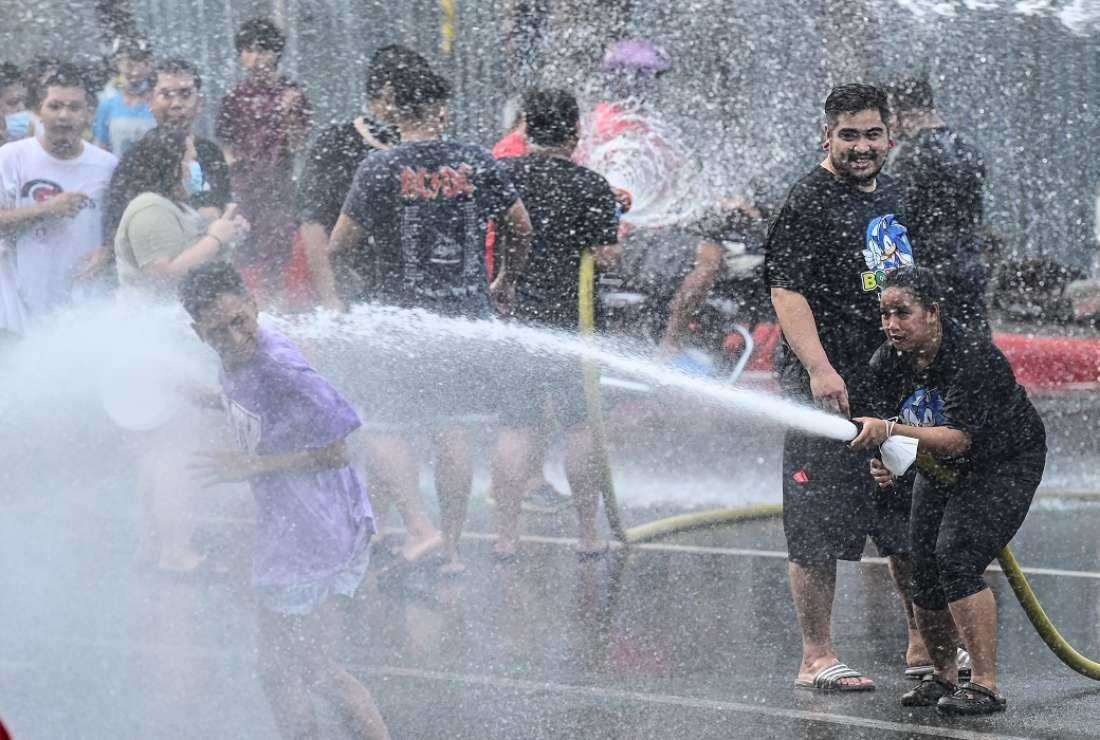
Residents splash and spray water over pedestrians as they take part in celebrations for their patron saint, John the Baptist, in San Juan, Manila on June 24, 2022. The Philippine capital and its surrounding areas are currently facing severe water shortages brought on by the dry season and the El Nino phenomenon. (Photo: AFP)
The Philippine capital and its surrounding areas are facing severe water shortages, forcing many residents to line up to fetch water from public faucets and the fire department in the early hours of the day.
Hundreds of residents in poor areas of Navotas City, Quezon City, in Metro Manila are having to form queues and wait for the city's fire department to fill their buckets with water.
The El Nino phenomenon and the dry season have caused the problem with water receding in the main local reservoir.
Residents have started queuing for water as early as 3 am to beat Manila’s traffic before heading to offices.
“I wake up a few minutes before 3 a.m. to get water. We have no water at home, so we need to fetch water from a public faucet along a sidewalk,” a Manila resident and postman, Gideon Carmona, 38, told UCA News on July 12.
Carmona said he first fetches water for his children, so they can go to school on time.
“I have two children in high school and they need to be there at 7:30 a.m. So, I fetch water for them first. I, as a father, am only secondary,” Carmona said.
Jenylyn Mesonia, 35, a mother of three, said she needed to be at the hotel where she works before 7 a.m., but cannot do so because she needs to line up for water first and then cook for her children.
“Normally, when I get up, I prepare their [children’s] breakfast. But, now I needed to fall in the water line. So, I end up late for work,” Mesonia told UCA News.
Maynilad Water Services, one of the largest private water concessionaires in the Philippines, says its customers are having to face shortages due to low supply in the Angat Dam, a reservoir northeast of the capital.
The raw water allocation for Maynilad has been brought down to 48 cubic meters per second due to the dam falling below its minimum operating level, the concessionaire said on July 12.
“The allocation was lowered in an effort to preserve water in the Angat Dam, given the possible worsening effects of El Nino in the coming months. However, this also means that Maynilad will get less supply than it needs to sustain normal service levels,” it added.
The Health Department has warned consumers to cover their water containers to prevent mosquito breeding.
“Please store water in clean and covered containers. Mosquitoes may use your stored waters as breeding places,” Health Secretary Teodoro Herbosa said at a press conference on July 11.
Herbosa reminded residents that water may become contaminated because of mineral deposits in pipes when the resumption of water starts.
Don’t drink the water from the faucets. Buy purified drinking water until the supply resumes normally. Drinking discolored water may cause cholera and other diseases, Herbosa added.
Caritas, the social arm of the Church, however, said buying potable water would affect the poor.
They don’t have money to pay their bills. It is easy to give advice but the reality is different, Caritas head Jose Colin Bagaforo told UCA News.
Bagaforo said Caritas has started collecting bottled water to be distributed among people in slums.
“We are thinking of the children and the elderly who need clean water but don’t have money to buy potable water. We will respond by giving them water to drink…. a simple gesture but essential at this time,” Bagaforo said.


